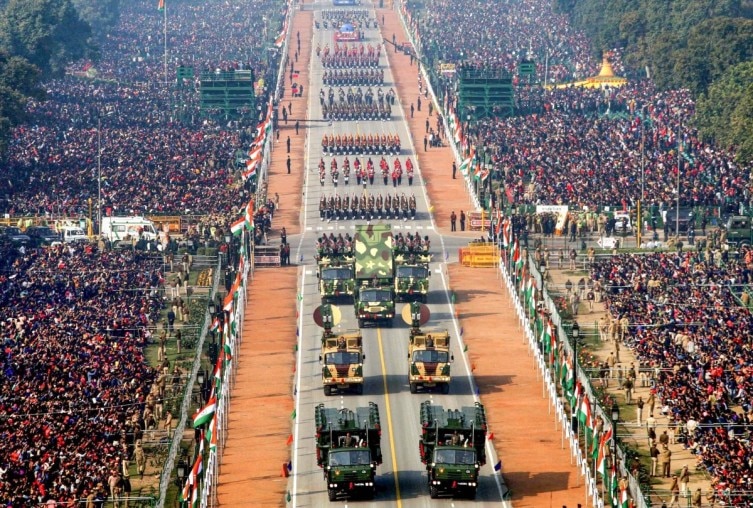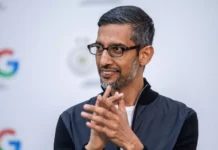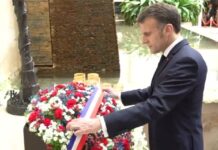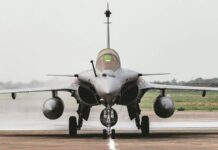NEW DELHI: India on Sunday celebrated its 71st Republic Day with a grand display of military prowess, vibrant cultural diversity and socio-economic progress on the majestic Rajpath where thousands of people, besides the country’s top political and military leadership and foreign dignitaries witnessed the annual parade.
Brazilian President Jair Messias Bolsonaro, who was the chief guest for this year’s ceremony, watched the dazzling parade at the historic avenue in the national capital as President Ram Nath Kovind took the salute, with Prime Minister Narendra Modi, Vice President Venkaiah Naidu and a host of other leaders in attendance.
There were several firsts in the celebrations this year, including the prime minister paying homage at the National War Memorial and the tri-service formation. Anti-satellite weapon system developed under Mission Shakti, newly-inducted stealth attack helicopter Apache and transport chopper Chinook, and artillery gun system ‘Dhanush’ were among the key military assets exhibited for the first time.
The 90-minute extravaganza, symbolic of national pride, left the spectators transfixed as soldiers from the three services, paramilitary and others marched down the central boulevard on a sunny winter morning.
The military band played the national anthem with a 21-gun salute in the background as President Kovind unfurled the tricolour at the Rajpath before the start of parade, which also included mechanised columns, gravity-defying formations by CRPF’s all-women motorcycle team, multi-hued floats, cultural performances by school students and a flypast in which around 40 aircraft took part.
From depicting Goa’s ‘Save the frog’ campaign and ‘Back to village’ programme of Jammu and Kashmir, which participated in the parade for the first time as a Union Territory, to Kullu Dusshera festival in Himachal Pradesh, Rath Yatra in Odisha and Iyyanar deity statue in Tamil Nadu, 22 tableaux with varied themes rolled down the Rajpath in coruscating colours.
Forty-nine children — 18 girls and 31 boys — honoured with the Pradhan Mantri Rashtriya Bal Puruskar for their exceptional achievement were greeted with applause as they were driven in decorated jeeps.
Students from different schools presented performances that showed the positive effects of Yoga, the different influences that have shaped Garba, the most popular folk dance of Gujarat, the culture of “Bauls”, a group of mystic minstrels from Bengal comprising of both Vaishnava-Hindu and Sufi Muslims, and Rajasthan folk dance.
Another attraction was the bedecked camel contingent of the Border Security Force. Along with it was the camel-mounted band, one of its kind in the world.
Women power too was on full display during the celebrations. Captain Tania Sher Gill, a fourth generation Army officer, led an all-men marching contingent of the Corps of Signals.
Women personnel of the Central Reserve Police Force (CRPF) performed jaw-dropping stunts as their motorbikes raced down the Rajpath.
“I am so moved, inspired…. I am preparing for exams to join Haryana Police, but this has changed my mind. I will join CRPF now,” said Diksha Chaudhary, 19, as she stood atop her chair, clapped and saluted the soldiers.
Several Union ministers, including Home Minister Amit Shah, Defence Minister Rajnath Singh and External Affairs Minister S Jaishankar, former prime minister Manmohan Singh, Congress president Sonia Gandhi, senior BJP leader L K Advani, BJP president J P Nadda, Lok Sabha Speaker Om Birla, Chief Justice of India S A Bobde and Delhi Chief Minister Arvind Kejriwal were among those present.
The grand finale of the parade was a spectacular flypast which commenced with the ‘Trishul’ formation, comprising three ALH helicopters in ‘Vic’ formation. This is for the first time that a “tri-service formation” took part in the Republic Day.
The next formation comprising three Chinook helicopter flew in ‘Vic’ formation at a speed of 180 kilometres per hour and a height of 100 metres, followed by five Apache attack helicopters.
Besides this, three Dornier aircraft, C-130J Super Hercules, three C-17 Globemaster ‘Netra’ and the “Eye in the Sky”, airborne early warning and control systems on Brazil-built Embraer, were part of the flypast.
Fighter jets Jaguars and Sukhois were also part of the flypast.
In the mechanized colums, three indigenously-developed battle tank T-90 Bhishma, three Ballaway Machine Pikate, three K-9 Vajra gun system, two transportable satellite terminal (TST) and two Akash surface-to-air-missiles, were also showcased.
The Indian Air Force tableau showcased scaled down models of Tejas aircraft, the Light Combat Helicopter, Akash Missiles System, and Astra missiles. The Navy’s tableau displayed models of Kolkata-class stealth destroyer, a Kalvari-class submarine and the country’s first indigenous aircraft carrier Vikrant with MiG-29K aircraft.
Several ministers were on their feet cheering for their respective states and departments as the tableaux came up. The Ministry of Jal Shakti showcased on its float the government’s new initiative “Jal Jeevan Mission” aimed at providing functional tap connection to every rural household by 2024.
The National Disaster Response Force tableau featured cutting-edge technology and instruments used by the NDRF during rescue operations in flood-hit areas and Delhi’s Anaj Mandi inferno last year. Jammu and Kashmir had the “Back to Village” programme as its theme. The programme launched last year is a first-of-its-kind initiative to reach out to the people at the grassroots level.
The tableau of Punjab depicted the 550th anniversary of Sikhism founder Guru Nanak. Modi was seen explaining the tableau to the Brazilian president when it rolled down in front of the saluting dias.
Another tableau was based on the undaunting spirit and desire of military veterans to contribute to the nation. Several gallantry award winners, including Param Vir Charka recipients Subedar Major and Honorary Captain Bana Singh (retired), Subedar Yogendra Singh Yadav and Subedar Sanjay Kumar, were part of the parade
Earlier in the day, Prime Minister Modi took to Twitter to extend his greetings. “Wishing everyone a happy #RepublicDay. Jai Hind,” he tweeted. Continuing his tradition of donning colourful turbans on Republic Day and Independence Day celebrations, the prime minister sported a saffron ‘bandhej’ headgear this year.
Modi paid tributes to martyrs by laying a wreath at the National War Memorial in the presence of Defence Minister Rajnath Singh, the three service chiefs and the first Chief of Defence Staff Bipin Rawat.
In the past, the ceremony was held at the Amar Jawan Jyoti at the India Gate.
After the Republic Day parade, Modi waved at the cheering crowd while walking down the Rajpath, even as his carcade followed him slowly. The entire national capital had been put under a multi-layered, ground-to-air security cover with thousands of armed personnel keeping a tight vigil, aided by drones, CCTV cameras and facial recognition devices. Anti-aircraft guns had been deployed on the ground.
Brazilian President Bolsonaro was the third leader from the country to attend the parade as the chief guest. The last time a Brazilian President was the chief guest was in 2004 when Luiz Inacio Lula da Silva was invited. Last year, South African President Cyril Ramaphosa was the chief guest at the Republic Day parade, while in 2018, leaders of all 10 ASEAN countries attended the Republic Day celebrations. PTI







